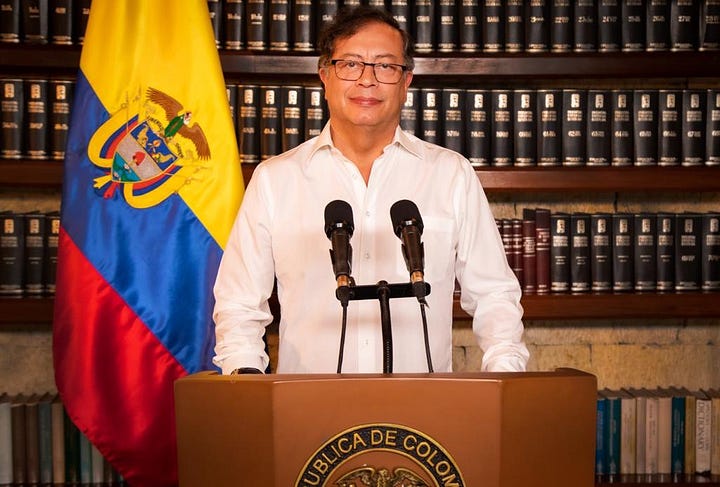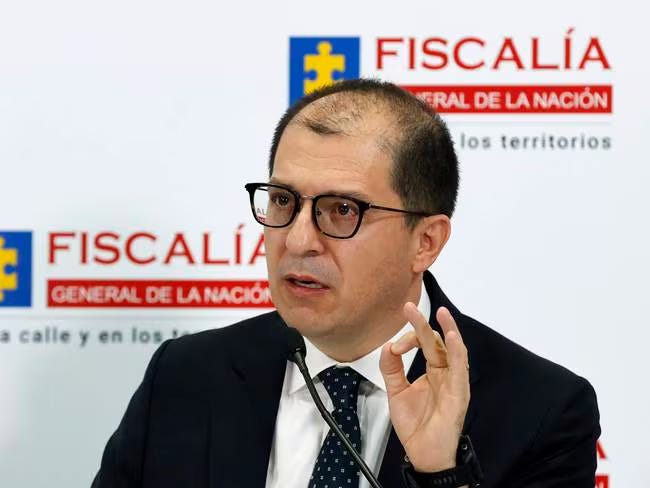Colombia's fight for a new AG gets physical
The spot for top-cop is open. But can the process confirm someone who isn't also a criminal?
Colombia’s Prosecutor’s Office has long been plagued by politicization and accusations of corruption. For the last few decades that politicization occurred squarely in favor of the ruling parties who governed the country— especially during the county’s 53-year-long civil war.
But the victory of the country’s first leftist president, Gustavo Petro, brought about a sharp rupture in that dynamic. Top officials in the Attorney General’s office have lately found themselves in the unusual position of criticizing and obstructing the president rather than uncritically defending him.
Public clashes between the president and the country’s top cop have led to accusations that the Prosecutor’s Office may be attempting to protect corrupt allies within the political establishment as well as their own ranks.
That enmity came to a head this week during protests at the Supreme Court building over the ongoing deadlock to appoint a new AG when the current one steps down next week.
At moments, protests turned violent, and both sides accused the other of fomenting a “constitutional crisis”.
But it’s all part of a larger power struggle between two different parts of the executive branch— the president and the country’s Prosecutor’s Office.
And the struggle has gotten increasingly ugly.


OK, but where did this feud come from?
Public confidence in the Prosecutor’s Office in Colombia is incredibly low, in part due to a series of recent scandals, but also due to a sense that criminals in the country enjoy an astonishing degree of impunity, especially if they have resources and political connections.
That perception seems to be well-founded. According to government data, the Prosecutor General’s Office successfully prosecuted only 11,816 criminals in 2022, which is 0.7% of the 1,648,388 crimes reported by citizens.
But beyond what seems to be an institutional collapse in crime fighting broadly, the Prosecutor’s Office has often found itself in the headlines for squashing investigations into criminality rather than pursuing them, and even committing illegal actions themselves.
The office has illegally wiretapped journalists and political activists, protected political elites from drug-trafficking investigations, been credibly accused of protecting criminal paramilitary groups, and persecuted political opposition to ruling parties with every tool at their disposal,
Historically, the Office of the Attorney General, with a few notable exceptions, has long defended wealthy right-wing politicians and come down squarely on the side of the government establishment.
But for the first time, they now find themselves pitted against a sitting president.
Almost immediately after Petro took office, the country’s AG, Francisco Barbosa, began to attack the president’s policy— as well as the president personally — over his plans for bringing “Total Peace” to Colombia by negotiating with armed groups, as well as over his distant past as a member of the now-defunct guerrilla group M-19.
Petro, hardly known for his discipline in the communications department (he often writes long screeds on social media and has an unfortunate history of occasionally amplifying false information), was all too happy to escalate the feud.
But the rivalry between the two powerful men escalated a few months ago after two important events— Petro’s short list of candidates to replace Barbosa, three women who seem to represent truly independent and qualified aspirants to the office, and development in the Fiscalia’s criminal case against the president’s son, Nicolas Petro.
The younger Petro, who had long been estranged from his father, allegedly tried to sell the political influence of his father in the run-up to the election. In light of the accusations, Petro called for a formal investigation.
Evidence strongly suggests Nicolas Petro may be guilty, but there is no evidence Petro was involved in the scheme, or even aware of it. His son seems to have been selling favors he couldn’t deliver on, and as part of those efforts may have made overtures to narco-traffickers.
That hasn’t stopped Barbosa from claiming, without evidence, that Petro has tried to interfere in the process, and that the president’s problem with the AG office stems not from corruption and politicization, but rather from the case against his son.
But Barbosa is about to step down on February 13. The decision of who will be his successor has led to an intense public battle— and also a legal one.
And the stakes for both sides, as well as gangsters who rely on the current system to protect them, could not be higher.
Meanwhile, fights in the street and fights in the courts
The legal fights have at times spiraled into physical confrontations.
In otherwise peaceful demonstrations on Wednesday in Bogota, some protestors battled with police outside the court building, and a small few may have even attempted to storm the building.
Petro’s supporters view the Supreme Court justices as complicit in obstruction by the AG’s office.
According to the Constitution, the president has the power to appoint the top executive of the Prosecutor’s Office— though the candidate must be confirmed by a majority of the court.
For months, some judges have “voted blank”, in order to obstruct the process. One magistrate even submitted a legal filing claiming that because all of the candidates were women, his “freedom of expression was being violated.”
It’s not unusual for the court to take its time appointing a new candidate, but what is new about the current situation is that this is the first time it has occurred under an AG openly hostile to the president and perhaps one even trying openly to subvert the process.
Until the court makes up its mind, Barbosa has the power to appoint an interim AG, but he has chosen to use that power to inflame tensions by nominating Martha Mancera, who is the subject of credible accusations that she may be using the power of her office to protect organized crime.
(We wrote about this in detail last week, article linked below)
And the judges? What’s their deal? Are they complicit?
All of the current sitting members of the Supreme Court were appointed by right-wing administrations, which have always held power in Colombia. Though not usually very vocal on day-to-day politics, at least in the public sphere, it is safe to assume most have strong ideological disagreements with the president.
Corruption is also not unheard of within their ranks. In 2021, some judges were arrested for their part in a deeply organized vote-selling scheme that also snared several prosecutors, lawyers, and court employees.
Called “the Cartel of the Robe”, the operation accepted bribes in return for guaranteeing favorable outcomes for the political elites who paid them.
The Judiciary also has deep contacts within the AG’s office. This week Colombian journalist Gonzalo Guillén published a list of all the family members of Supreme Court judges who either work directly for Barbosa or have business ties to his family.
Although the correlation is not perfect, many of those same names on Guillen’s list have been “voting blank” in the confirmation process for a new AG, which is obstructing the process.
There is a deep sense among experts that corrupt actors within the system deeply fear the appointment of a top Prosecutor who would go after crime within the ranks of government.
“The Supreme Court is blocking Petro’s Attorney General picks, repeatedly, for no good reason,” said Will Freeman, an analyst at the Council for Foreign Relations. “They’re all highly credentialed. They’re all independent, and none are close friends of Petro.”
Adrienne Alsema, editor of Colombia Reports, put it more succinctly. “Heads are going to roll,” if someone truly independent is confirmed, he said to PWS in a phone conversation. “The rot goes deep within the justice system”, he continued, “And no one wants the heads that roll to be theirs.”
The Big Headlines in LATAM
As expected by polls, President Najib Bukele won re-election in El Salvador by a landslide. The self-proclaimed “coolest dictator in the world” faced no serious challenger. His party also swept Congress.
In a victory speech, Bukele railed against the US, Europe, journalists, and humanitarian organizations for criticism of his human rights record. As his “temporary” state of emergency enters its second year, hardline tactics by law enforcement have indisputably lowered the crime rate.
But nearly 80,000 people have been arrested since it began, many unlawfully or arbitrarily, and El Salvador has surpassed the U.S. as the country with the highest incarceration rate in the world.
In Argentina, right-wing president Milei’s reform package cleared an important hurdle in Congress — despite protests in the streets — only to be delayed again by the majority party. His omnibus bill, which includes drastic cuts to state services and an expansion of presidential power, now faces an article-by-article vote.
Several new provisions were added to the already sprawling legislation, which includes over 200 separate laws and policy changes, including one that would outlaw abortion.
Abortion law was liberalized in Argentina after the Voluntary Interruption of Pregnancy Bill (Argentina) was passed by the National Congress in December 2020. When Congress finally approves a version of Milei’s reforms, the package will go to the Senate for confirmation. Lawmakers in the upper chamber can also kick the omnibus back to Congress for further reform rather than rubber stamp the legislation.
Venezuela’s ban on opposition politicians from running in presidential elections this year has ratcheted up tensions with the U.S. Sanctions were relaxed last year in return for promises by Venezuelan President Nicolas Maduro to hold free elections as part of the Barbados agreements.
The U.S. State department has requested the help of Colombian President Gustavo Petro in negotiating with Maduro over the release of opposition candidates arrested by the government, and over a dozen U.S citizens being held by Venezuela.
Ship’s Business
Freelance work in Colombia has been slow for Joshua lately. But as he hunkers down, stalled by the doldrums of no wind on the high seas, he has been concentrating on PWS. Fortunately, he has a trip commissioned in the Colombian-Venezuelan borderlands at the end of February.
A trip into the dense tropical jungle may be just what he needs to overcome the financial slump, as well as have a few adventures.
Speaking of adventures, Amy is set to travel to Colombia soon. Amazingly, despite working together for over two years, the PWS crew has never actually all been in the same room at the same time.
A formal meeting is finally in the cards for the pirate crew! And there shall be drinking of grog to celebrate!
As always, if you haven’t taken out a paid subscription to our newsletter, we urge you to consider doing so. We have plans starting out at just $5/month. And as Joshua can attest, every little bit helps.
Spanish Word of the Week
Bizarro!
This word seems easy. It just means “bizarre” right? Well, not quite. In Spanish, the word comes from the Italian word “Bizzaro”, which means “strong, brave or furious” and was used to describe Italian soldiers from the period when Italy was a series of warring states. For a very long time, that’s what it meant in Spanish also.
BUT in French, the word means “strange” or “extravagant”. English adopted the French meaning for the word, after slightly changing the spelling, as well as slightly modifying the meaning to “odd, peculiar, outlandish or curious”.
AND THEN usage of the English sense of the word began to affect Spanish speakers, especially in Latin America, so that some have adopted the English meaning rather than the Italian one.
It’s wild how language evolves. All of this is to say, if someone in Latin America says bizarro to you, they could be trying to communicate a lot of different possible ideas.
We wish you luck figuring out which meaning they intend. Honestly, the whole thing strikes us as a bit bizarre.
Bizarro!
Hasta pronto piratas!



